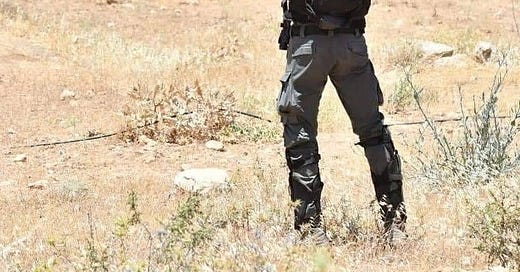Guest Post: Sam Stein
Israeli settlers, military attack Palestinians and Jews as they attempt to repair a damaged road in Masafer Yatta
This week I invited solidarity activist Sam Stein to write about a demonstration in Masafer Yatta that he recently attended. Sam grew up in Lawrence, New York, in a large Orthodox community. In the spring of 2021, Sam joined the Center for Jewish Nonviolence (CJNV) and spent four months living in Palestinian villages in the South Hebron Hills, like I did this year. Sam is now finishing the year-long NIF/Shatil Social Justice Fellowship.
Palestinians, Israelis, and international activists gathered last Friday to protest and attempt to repair the main road leading to the Palestinian village of Bir El Eid (occupied West Bank), which is frequently blocked by the settlers from the illegal outpost Mitzpe Yair. As is common—almost routine—in protests in the West Bank, the Israeli army was incredibly trigger happy with stun grenades and tear gas, and there are multiple videos of soldiers pushing and shoving protesters.

Soldiers knocked an elderly Palestinian who uses a cane to the ground, shot tear gas at a CJNV activist, hitting her in the leg and burning her, and pushed another CNJV activist, injuring her knee. Settlers threw rocks through the windows of the car of three Israeli activists—Itai Feitelson, Nur Zohar, and Yasmin Eren-Vardi—sending two of them to the hospital. The Israeli activists have testified that the army was present during this attack and did nothing. In the end, the road was not repaired.
From the outside, the protest might sound like a colossal failure. And yet, after hearing Issa Amro, a Palestinian activist from the group Youth Against Settlements, light-heartedly tell the international Jewish activists from CJNV, “You all need to bring five friends next year,” it was hard to think of the action as anything other than a massive success.
It’s no secret that Israel cares greatly about its public image. The Israeli government spends more than 10 million USD annually on “hasbara,” which can generously be translated as “outreach” and less generously translated as “propaganda.” However, it seems no sum of money can compete with the grassroots Palestinian resistance movement, which in recent years has been boosted by civilian documentation and social media activism. The results of this movement are clear, as young Americans’ opinion of Israel is divebombing, and a quarter of American Jews agree that Israel is an apartheid state. The battle for Palestinian liberation has largely been a battle for public opinion, and the Palestinian side is winning.
After Friday’s protest, Palestinian activist Basil Al-Adraa told CJNV, “Our protests show the racism in how the Israeli army treats us.” There are pictures and videos of the army and settlers being blatantly violent in a manner that all but the far-right would find grotesque. Israelis will see the video of Itai, Yasmin, and Nur being left for dead by the army—the story has already been picked up by multiple mainstream Israeli papers such as Haaretz and YNet—and they might question whether the Israeli Defense Force really has Israelis’ defense in mind. Diaspora Jews will see pictures of their peers being assaulted and realize that the Israeli army is not quite as benevolent as they were taught in Hebrew school.
The official statement from the Israeli army (translated from Hebrew) in response to the attack of Itai, Nur, and Yasmin read: “a report was received on a disagreement between activists that were driving in their car, and a number of settlers that threw stones towards them. IDF forces… recognized the incident from afar and rushed to distance the settlers from the area.” However, photojournalist Oren Ziv posted a video showing that the settlers left of their own accord after assaulting the solidarity activists. This military statement—which uses language that downplays the severity of the incident, and contradicts verifiable facts—is unlikely to satisfy anyone other than their firmest supporters. It appears that the Hasbara machine is struggling to compete with modern access to accurate, uncensored information.
Jewish allies of the Palestinian liberation movement can usually be characterized by a profound pessimism, and it’s fairly obvious why. The Kahanist far-right in Israel is gaining power, international condemnation of Israel continues to be little more than meek words with no action behind them, and U.S. military funding continues to flow. Despite everything, I myself am an optimist. I’ve seen the change in the hivemind of the American Jewish community first hand. The CJNV delegation included two Jews who grew up in the same far-right Modern Orthodox community that I did. I’ve had friends from my childhood, some still religious, some still identifying as Zionists, message me to express their unabashed support for my activism. Ten years ago, that would have been unthinkable.
Israel's military occupation seems as invincible as every fascist regime before it, but I believe that, just like the seemingly invincible regimes of the past, it will fall. I daven that it will be in my lifetime and that I can experience an Israel-Palestine that includes equal rights for all. On Friday, more than one hundred Palestinian, Israeli, and international activists showed their solidarity to the Palestinians of Masafer Yatta and to the world, and I think both of those parties got the message.




